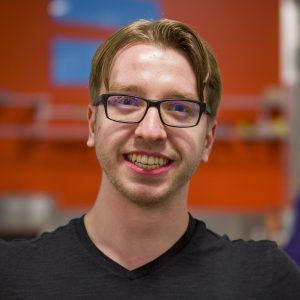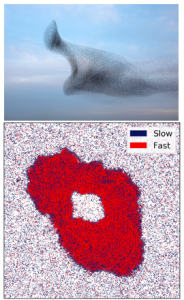Nick Lauersdorf Awarded National Defense Science and Engineering (NDSEG) Fellowship
 Applied Physical Sciences graduate student Nick Lauersdorf has been awarded the National Defense Science and Engineering Fellowship (NDSEG)! This fellowship has been awarded to him in recognition of his academic excellence in Science, Technology, Engineering and Math (STEM) achievements, from over 7,942 applications that were received this year.
Applied Physical Sciences graduate student Nick Lauersdorf has been awarded the National Defense Science and Engineering Fellowship (NDSEG)! This fellowship has been awarded to him in recognition of his academic excellence in Science, Technology, Engineering and Math (STEM) achievements, from over 7,942 applications that were received this year.
As an awardee, Nick will receive full tuition and all mandatory fees coverage for up to 36 months in addition to an annual stipend and travel allowance. We asked Nick a few questions about his studies in the department, and how this fellowship plays a role in his academic interests.
Why did you decide to come to UNC?
The graduate student and APS department culture was a major factor in my decision to attend UNC. The APS department is a fairly new department, so it is quickly growing and developing. As a result, the APS administration is highly receptive to graduate students’ perspectives on adjustments to the department, such as the course curriculum, doctoral requirements, and faculty/administration hiring, in order to improve the graduate student experience.
How did you find out about the fellowship?
You can find a lot of information about fellowships simply by talking to your PI, and more senior graduate students who have gone through the same application process are always willing to help. In addition, utilizing the resources available through UNC’s Graduate Funding and Information Center was very helpful, including various funding databases.
What was the process for submitting the application?
The process of and material for applying to NDSEG is very similar to NSF GRFP. Most of the fellowship applications require a similar personal statement and research proposal. However, the content must be tailored to the goals of the agency and fellowship that would be funding you. Besides reading the fellowship guidelines thoroughly, Professor Scott Warren’s CHEM-791 course, which takes you through the steps of drafting your NSF GRFP proposal, is incredibly useful for improving your grant/fellowship writing skills.
What is your research topic?

Active-matter systems consist of self-propelled (active) components that locally consume energy to move and exert forces, thus being inherently out of equilibrium. Examples include natural systems of living matter, such as flocks of birds [Figure 1A], crowds of people, and biological tissue, as well as synthetic systems, such as self-propelled nanoparticles. From a materials point of view, these non-equilibrium systems exhibit unique collective behavior compared to traditional materials, e.g. healing of biological tissue and properties of cellular matter. So far, the focus on colloidal active matter has been on monodisperse single-component systems. However, allowing for multi-component active matter opens an enormous parameter space and thus a host of opportunities in materials science. I will implement the Active Brownian Particle (ABP) model, designed to represent self-propelled colloids, and study how multiple species, e.g. fast and slow self-propelled colloids within an active mixture [Figure 1B], influence non-equilibrium phases and steady states, and aim to design states with desirable properties. For example, I will design a colloidal system that performs specific useful tasks, such as, segregation of species, encapsulation of one species by the other. The same model applies on the macroscopic scale; therefore, I will design an active herding system, where robots are used to control and mitigate crowds, through exploiting active-matter emergent behavior.
How does this fellowship contribute to your career goals?
Combining my passion for business and science, I want to become a CEO of my own R&D company to effectively translate scientific knowledge to application and, in turn, society. Receiving the DoD NDSEG will enable my goal by allowing me to focus on research while granting me more time to pursue career development opportunities, such as earning a graduate certificate in business.
Any advice for students considering a career path similar to yours?
Network and seek out skilled mentors that can give you advice to help you overcome the various roadblocks that present themselves on your journey towards your goal, whether the struggles are related to research, business, professional development, or personal.
The NDSEG Fellowship Program is sponsored by the Air Force Office of Scientific Research (AFOSR), the Army Research Office (ARO), and the Office of Naval Research (ONR) under the Office of the Under Secretary for Research and Engineering.

